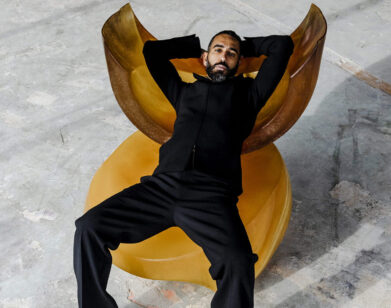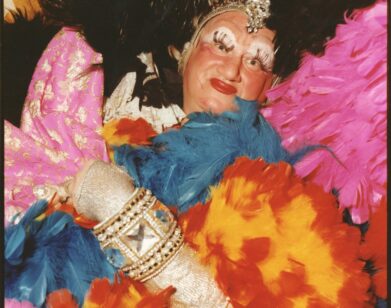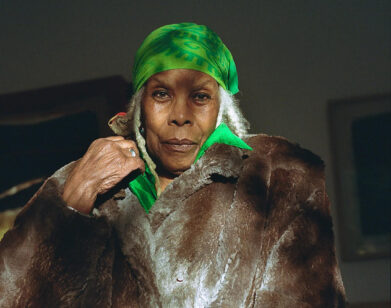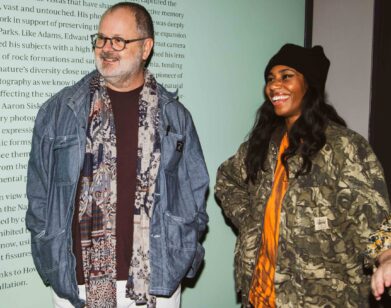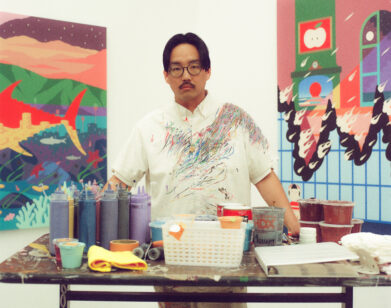Amalia Ulman
AMALIA ULMAN IN NEW YORK, JULY 2015.
Last year at Art Basel Miami Beach, a little-known artist named Amalia Ulman appeared on a panel called “Instagram as an Artistic Medium.” Instagram was for real selves, real insight, real art, and above all, selfies, according to her esteemed co-panelists Simon de Pury, Hans-Ulrich Obrist, Klaus Biesenbach, and the company’s CEO, Kevin Systrom. Their points, however, were somewhat compromised by the fact that the then-25-year-old Ulman spoke first. In a slideshow presentation, she explained how she spent five months crafting a falsified persona under her handle @amaliaulman. In 186 posts, the Instagram artwork Excellences & Perfections chronicled her character’s move to “the big city,” initial elation, a nervous breakdown, and eventual self-acceptance. Taking cues from popular users, Ulman played up gendered symbols of luxury (selfies in posh settings; softly lit frothy cappuccinos and rose petals; a breast augmentation) all tuned to her fictitious emotional roller coaster. She wound up with 89,000 followers. “It was funny to have other panelists saying, ‘Instagram is a place where you can be yourself,’” Ulman reflects. “People love believing in things, and people still think the internet is a place of authenticity, but everyone is selecting, or even fabricating, what they post.”
Ironically, many first learned of Ulman through the Miami presentation, and soon after, she went viral in her own right as a promising young artist. Last January she had her first New York solo show at James Fuentes gallery, an installation of desolate wire sculptures as a meditation on violence, partly inspired by her hospitalization after a bus crash in 2013. (It is now on view at the Utah Museum of Contemporary Art.) In a show this past spring at Showroom MAMA in Rotterdam, she directed an adult film with porn stars playing creative-industry hipsters. This month at Frieze London, she’s looking beyond selfies to a more surreptitious form of feminine expression for a piece entitled The Annals of Private History. Through a fictionalized video essay about the history of diaries and women, she ponders “cute” journals with locks given to girls and contrasts them to anonymous online spaces where people detail taboo experiences like fasting, plastic surgery, and prostitution. “Everything is so public now, so everyone self-censors,” she says. “It’s only within these diaries or forums where that’s not the case.” She plans to trap viewers in a cushy white room without their phones, where they will be subjected to the video’s infantilizing voice-over until their pre-assigned number is called and they are permitted to leave.
Ulman’s practice may seem enigmatic, reflecting the messiness between real and digital identity, but specific themes have emerged: in particular, she riffs on millennial narcissism, teasing out performative displays of “pretty” and “cute” that serve to mask conspicuous consumption and self-involvement. Growing up in the north of Spain, she made virtual friends in chat rooms and is still curious about the nature of human connection on the internet. Ulman has also taken up pole-dancing classes for exercise since her injuries from the bus crash left her unable to jog, and will choreograph pole-dance scenes for a play she’s working on. She’s even built a dance studio into her new home in Los Angeles. Notably, Ulman has decided against having access to the internet in the apartment. “I like having some sort of restraints,” she says. “I need a space where I can be bored and look at the ceiling and think.”
We spoke with Ulman over lunch when she was visiting New York.
RACHEL SMALL: So, does your apartment even have a bedroom?
AMALIA ULMAN: Yes. It’s a one-bedroom apartment, just for me. Half is a ballerina studio: I have mirrors, the pole, the barre, the stretch rope. I don’t need the internet. I never did ballet, but my mom used to dance, and I think she never saw me as [suited] for ballet because I was kind of clumsy.
SMALL: How did you get into pole-dancing?
ULMAN: I started doing it for the pictures for Excellences and Perfections, and then I started doing it because I cannot run anymore. I used to run every night and I love that buzz. It takes a long time to get into it because the first months are really boring, because there’s a lot of training, and then you get to the point where you spin around and it’s like, “Whoa—what did I just do?” That’s when people get addicted to it and keep on going because there’s so much to learn.
I’m very interested in including pole-dancing into my work, especially because of the background it has and how it’s tied to pornography, to prostitution, to strip tease. I know a lot about the sex industry, but I’ve never been to a strip club. It’s not like I don’t like it, but I’m just interested in the technicality, how the body relates to that. For women that do pole-dancing, their bodies are different, way more muscular, and they’re not feminized at all. So it’s a weird contrast. Yeah, it’s sexualized, but still, they look really strong, you know?
SMALL: It’s, theoretically, traditionally for someone else’s entertainment but actually you have to be pretty powerful to do it.
ULMAN: It’s confusing because it’s tied to the sex industry. There’s ignorance about the history of it, like circuses and all these kinds of performativity.
SMALL: So, in Excellences and Perfections, there are pictures of you pole dancing?
ULMAN: Just holding the pole. But that’s the studio I still go to.
SMALL: Did you research that location, or the others that you photographed yourself at, or was it coincidence that you found them?
ULMAN: I have to say, I really do plan out most of my locations, but I also get really lucky, to be honest. I leave a lot to chance. I like putting myself in situations where things will happen, instead of planning everything…I feel like I’m very stubborn. I will insist, “It’s not working! It’s going to work!” And then something really bad happens and I think that I shouldn’t have insisted so much. I should have let it go. So, in my work I like when things keep on flowing.
Forcing things or trying to manipulate them too much, in the end, that doesn’t work for me. I need to be around someone a few times to remember their names; it’s the same for lived experiences. That’s why I travel a lot because I can’t just read or research something. I have to go through it to be able to understand it. Which makes things interesting, but it is kind of dangerous sometimes. But, I can’t work otherwise.
SMALL: Wait, how is it dangerous?
ULMAN: I mean, less so now, but when I was younger I would put myself in slightly dangerous situations because I felt I needed to go through them instead of just reading about them. I would travel by myself a lot—too much—without any experience. I don’t regret it because it was obviously a good learning experience, but now it’s like…what was I doing?
SMALL: But it is so important to throw yourself into situations where you don’t know what is going to happen. Because when there is a situation that you don’t expect, and you don’t choose, then you’re better equipped to handle it, I feel.
ULMAN: That’s why I still enjoy libraries. I was a librarian [at Central Saint Martins] and I always liked that way better than the internet. There’s that chance [element]—you can just walk around and find something and it’s not determined by your previous searches. That’s why I sometimes find the internet very limiting. Everything starts getting smaller and smaller and smaller, whereas if you go to an analog place, like in a library, or if you travel somewhere, something will happen in front of you that will change your research, your direction. That’s something I appreciate. One of my favorite things was putting [other students’] books back. There would be books that I would know, and then there would be another book I would have never thought [to look for], because it’s one step outside of my field. I find that very interesting in terms of fate and research and leaving something up to chance and not having absolute control.
SMALL: Everyone talks about how “the internet is so limitless,” but most people just go on Facebook, check Twitter, and check Instagram. It’s a cycle. Moving to your piece for Frieze Projects, The Annals of Private History, which you are doing in collaboration with Arcadia Missa gallery, can you walk me through the concept?
ULMAN: I’m very interested in this idea of women writing diaries and how all that information gets lost. The internet has all of these anonymous diaries that are main sources of information for this kind of knowledge that is not published anywhere, [because it is] looked down upon, or taboo. For example, as an escort, you can get guidelines and tips. There are also fasting diaries—people who go on fasting retreats and start writing diaries—and you can see the progress of them losing spark…some of them are transcripts from paper and [they write things like], “I can’t hold a pen anymore because I’m so weak.” There are anonymous diaries for plastic surgery. It’s knowledge in the form of diary, anonymous diaries, that build these parallel histories that are not a part of the mainstream. But, at least they’re not lost. Before, I’d say that these diaries would be written in a notebook and be forgotten. Now, I believe they have relevance.
SMALL: And it’s in the service of others.
ULMAN: I think in a place as social as the internet, right now, these spaces are still old school, anonymous sources of information. It’s purely about knowledge, instead of creating this cultural capital through your image or whatever. It’s in the anonymous, hidden blogs where these people will post all the information, and all the frustration, tears. [For] other people, all these feelings and emotions [are hidden] because everything is so public now. So [they act as if] everything is fine, because we’re being photographed all the time. Everyone self-censors. I think it’s also because so much pressure, or value, has been put on branding and monetizing that there’s the mindset, “Oh, it’s not worth it if no one’s going to see it.”
SMALL: And your self-brand can’t be nuanced. Everyone wants to know what to expect. Maybe a tiny surprise, but nothing actually shocking. You have to give people what they want without offending them or boring them.
ULMAN: With Excellences and Perfections, people got so mad at me for using fiction. That was the main critique: “It wasn’t the truth? How dare you! You lied to people!” Well, that’s because you should learn that everyone is lying online. I’m not the first one! There are so many girls that go to hotels to take a better selfie, or another expensive place. If they’re trying to be a social climber or whatever, that’s what they do. It’s normal. It’s becoming more and more normal to be conscious of those things. It’s funny how people still take it with this value of truth.
SMALL: Seriously. How will The Annals of Private History installation be set up?
ULMAN: I’m thinking about it as a video essay. The environment is inspired by a visit to the American embassy in Madrid, and also to my recent visit to North Korea. Continuing my interest in waiting rooms and “non-places,” we are creating a claustrophobic space and a series of guidelines to make the visitors uncomfortable; we’re taking away their phones and shoes. The idea is for people to focus and follow the video’s instructions, given by the narrator, which are directed to the audience. The script itself plays with ideas of control and submission, like in abusive relationships, but also authoritarian regimes and political propaganda. It’s all about the idea of the diary and keeping things inside, so I want people to have a dialogue within themselves, with the video.
FOR MORE ON THE ARTIST, VISIT HER WEBSITE.


